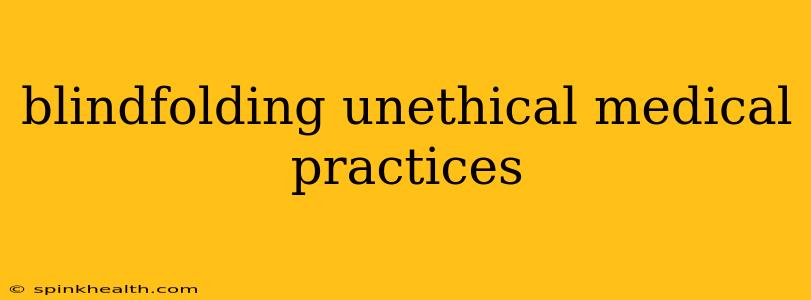The Shadowy World of Unethical Medical Practices: When Blindfolds Obscure the Truth
The medical profession rests on a foundation of trust. We entrust our well-being, sometimes our very lives, to the expertise and ethical conduct of doctors, nurses, and other healthcare providers. But what happens when that trust is betrayed? When the pursuit of profit, ambition, or even misguided intentions overshadows the Hippocratic Oath? This is the dark side of medicine, a world where unethical practices thrive, often shrouded in secrecy and deception.
This exploration delves into the unsettling reality of unethical medical practices, examining how they manifest and the devastating consequences they inflict on individuals and society. We will uncover the various ways these practices are disguised, often behind a veil of obfuscation that makes them difficult to detect and even more challenging to prosecute.
What are some examples of unethical medical practices?
Unethical medical practices encompass a broad range of actions, from seemingly minor infractions to egregious violations. Examples include:
- Overbilling and insurance fraud: This involves charging patients or insurance companies more than is necessary for services rendered, often involving inflated claims or billing for procedures not performed. The financial incentives can be powerful, leading to a culture of dishonesty.
- Unnecessary medical procedures: This can range from recommending surgeries or tests that are not medically necessary to prolonging hospital stays for financial gain. Patients are often vulnerable and susceptible to pressure from medical professionals.
- Misdiagnosis and mistreatment: These are serious breaches of medical ethics, leading to delayed or inadequate treatment, causing significant harm and even death. The consequences can be devastating for patients and their families.
- Lack of informed consent: Patients have the right to make informed decisions about their own healthcare. Failing to provide patients with sufficient information about procedures, treatments, and potential risks constitutes a major ethical violation.
- Patient exploitation: This particularly affects vulnerable populations, including the elderly, those with disabilities, and those from marginalized communities. It can involve taking advantage of patients' trust and financial resources.
- Ghost surgery: This involves a surgeon performing a procedure different from the one the patient consented to, or having another surgeon perform the operation entirely without the patient's knowledge or consent. This is a gross breach of trust.
How are unethical medical practices hidden?
The very nature of unethical medical practices is often clandestine. They rely on secrecy and deception to avoid detection. Some common methods include:
- Complex billing practices: Intricate billing systems can make it difficult for patients and even auditors to identify overcharging or fraudulent activities.
- Lack of transparency: Hospitals and clinics may withhold information about their pricing structures or the qualifications of their staff.
- Falsified medical records: Altering or fabricating medical records is a serious crime that obstructs investigations and protects unethical actors.
- Collusion between healthcare providers and other entities: This can involve relationships with pharmaceutical companies, medical equipment suppliers, or insurance companies that incentivize unethical practices.
How can we combat unethical medical practices?
Combating unethical medical practices requires a multi-pronged approach:
- Increased transparency and accountability: Regulations requiring greater transparency in billing practices, medical procedures, and provider qualifications are crucial. Independent audits and oversight mechanisms can help identify and address unethical behavior.
- Stronger whistleblower protections: Encouraging healthcare professionals to report unethical behavior without fear of retaliation is essential. Robust whistleblower protection laws are necessary.
- Patient education and empowerment: Educating patients about their rights and empowering them to ask questions and challenge medical decisions helps prevent exploitation.
- Improved regulatory oversight: Strengthening regulatory bodies and enhancing their investigative powers is crucial to effectively addressing unethical practices. This includes prompt and decisive action against those found guilty.
What are the consequences of unethical medical practices?
The consequences of unethical medical practices are far-reaching:
- Harm to patients: This can range from minor inconveniences to serious injuries and even death.
- Erosion of public trust: Unethical behavior damages public confidence in the medical profession, leading to hesitancy in seeking necessary care.
- Increased healthcare costs: Fraudulent billing and unnecessary procedures drive up healthcare costs for individuals and society as a whole.
- Legal repercussions: Those involved in unethical medical practices face potential criminal charges, civil lawsuits, and professional sanctions.
The fight against unethical medical practices is an ongoing battle. By increasing transparency, strengthening regulations, empowering patients, and encouraging whistleblowers, we can work towards a healthcare system built on trust, integrity, and patient well-being. The removal of the metaphorical blindfold reveals a clear path towards a more ethical and just healthcare system for all.

